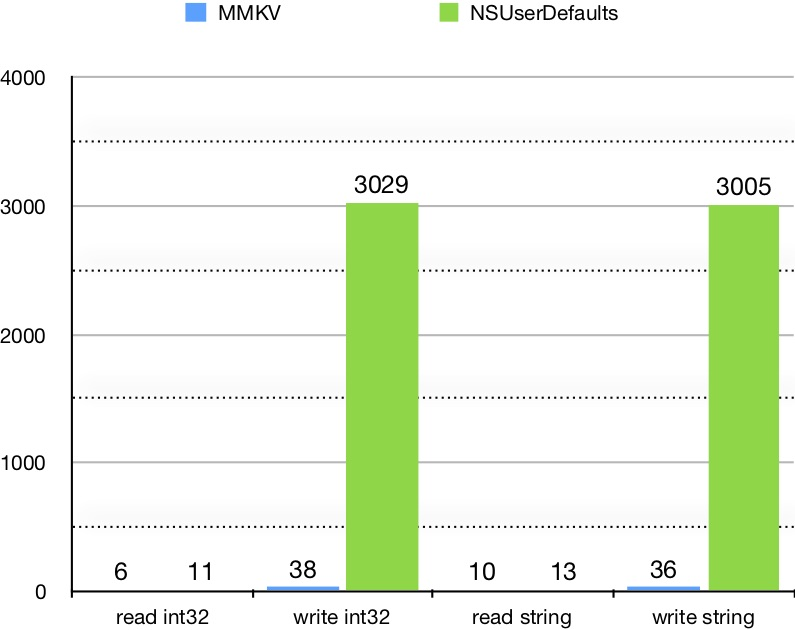Hello @Jarred-Sumner, I think this is good idea overal, but sometimes, when you need to push a big chunk of data it could be actually usefull to use async option, so your JS thread does not get stucked. Did you benchmark even bigger data on low end android devices?
I think that user should still have possibility to use async version of ‘setItem’ because we dont always expect data to be available immediately after writing them to storage.
MMKV: cross-platform mobile key/value store made by Tencent https://github.com/Tencent/MMKV JSI: JavaScript interface(?) -- its the base of React Native's new architecture that lets you skip the bridge.
Motivation
The bridge in React Native is really slow, and maintaining your own database is hard & not very fun (for me, at least).
Description
Instead of doing all that, you could just wrap MMKV and use the JSI to skip the bridge. It also makes it synchronous, which is actually good considering how fast it is.
I built this in my app.
Benchmarks of
MMKVfrom their github repo, as compared toNSUserDefaults:I haven't benchmarked the difference between
AsyncStorageandMMKV, but my app felt noticeably faster after I switched and that's all I cared about. It probably is a bad idea if the file size exceeds100MB, since its a memory-mapped database (so everything is stored in memory & synced automatically to disk)New feature implementation
Here's example code ripped out from my app where I have this working (renamed some things).
In JavaScript, this code is called via:
global.YeetStorage.getItem(key, type)global.YeetStorage.setItem(key, value, type)global.YeetStorage.removeItem(key)import "StorageModule.h"
import <ReactCommon/TurboModule.h>
import <Foundation/Foundation.h>
import <MMKV/MMKV.h>
@interface RCTBridge (ext)
StorageModule::StorageModule(RCTCxxBridge *bridge) : bridge_(bridge) { std::shared_ptr _jsInvoker = std::make_shared(bridge.reactInstance);
}
void StorageModule::install(RCTCxxBridge *bridge) { if (bridge.runtime == nullptr) { return; }
jsi::Runtime &runtime = (jsi::Runtime )bridge.runtime;
auto reaModuleName = "YeetStorage"; auto reaJsiModule = std::make_shared(std::move(bridge));
auto object = jsi::Object::createFromHostObject(runtime, reaJsiModule);
runtime.global().setProperty(runtime, reaModuleName, std::move(object));
}
jsi::Value StorageModule::get(jsi::Runtime &runtime, const jsi::PropNameID &name) { auto methodName = name.utf8(runtime);
if (methodName == "removeItem") { MMKV mmkv = [MMKV defaultMMKV]; return jsi::Function::createFromHostFunction(runtime, name, 1, [mmkv]( jsi::Runtime &runtime, const jsi::Value &thisValue, const jsi::Value arguments, size_t count) -> jsi::Value {
} else if (methodName == "getItem") { MMKV mmkv = [MMKV defaultMMKV]; return jsi::Function::createFromHostFunction(runtime, name, 2, [mmkv]( jsi::Runtime &runtime, const jsi::Value &thisValue, const jsi::Value arguments, size_t count) -> jsi::Value {
} else if (methodName == "setItem") { MMKV mmkv = [MMKV defaultMMKV]; return jsi::Function::createFromHostFunction(runtime, name, 3, [mmkv]( jsi::Runtime &runtime, const jsi::Value &thisValue, const jsi::Value arguments, size_t count) -> jsi::Value { NSString type = convertJSIStringToNSString(runtime, arguments[2].asString(runtime)); NSString key = convertJSIStringToNSString(runtime, arguments[0].asString(runtime));
}
return jsi::Value::undefined(); }
You would override
setBridgein theRCTBridgeModuleand callStorageModule::install(self.bridge);There's a better implementation here too, where you skip the Foundation primitives and use C++ directly. If you did that, you wouldn't pay the cost of converting from
std::stringNSString.